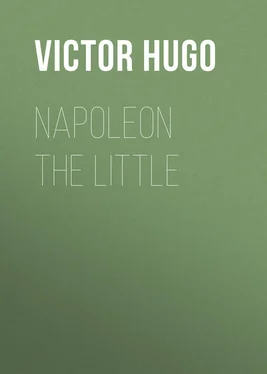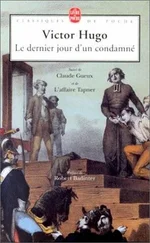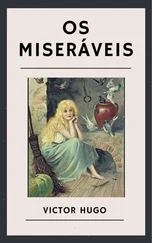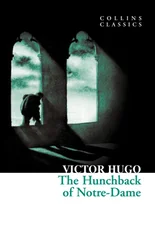Victor Hugo - Napoleon the Little
Здесь есть возможность читать онлайн «Victor Hugo - Napoleon the Little» — ознакомительный отрывок электронной книги совершенно бесплатно, а после прочтения отрывка купить полную версию. В некоторых случаях можно слушать аудио, скачать через торрент в формате fb2 и присутствует краткое содержание. Жанр: literature_19, foreign_antique, foreign_prose, на английском языке. Описание произведения, (предисловие) а так же отзывы посетителей доступны на портале библиотеки ЛибКат.
- Название:Napoleon the Little
- Автор:
- Жанр:
- Год:неизвестен
- ISBN:нет данных
- Рейтинг книги:3 / 5. Голосов: 1
-
Избранное:Добавить в избранное
- Отзывы:
-
Ваша оценка:
- 60
- 1
- 2
- 3
- 4
- 5
Napoleon the Little: краткое содержание, описание и аннотация
Предлагаем к чтению аннотацию, описание, краткое содержание или предисловие (зависит от того, что написал сам автор книги «Napoleon the Little»). Если вы не нашли необходимую информацию о книге — напишите в комментариях, мы постараемся отыскать её.
Napoleon the Little — читать онлайн ознакомительный отрывок
Ниже представлен текст книги, разбитый по страницам. Система сохранения места последней прочитанной страницы, позволяет с удобством читать онлайн бесплатно книгу «Napoleon the Little», без необходимости каждый раз заново искать на чём Вы остановились. Поставьте закладку, и сможете в любой момент перейти на страницу, на которой закончили чтение.
Интервал:
Закладка:
M. Q. – B. paid a visit to M. O. – B. and said to him: "Can you conceive the assurance of this Bonaparte? he has had the presumption to offer me the place of Master of Requests!" – "You refused it?" – "Certainly." – The next day, being offered the place of Councillor of State, salary twenty-five thousand francs, our indignant Master of Requests becomes a grateful Councillor of State. M. Q. – B. accepts.
One class of men rallied en masse: the fools! They comprise the sound part of the Corps Législatif. It was to them that the head of the State addressed this little flattery: – "The first test of the Constitution, entirely of French origin, must have convinced you that we possess the qualities of a strong and a free government. We are in earnest, discussion is free, and the vote of taxation decisive. France possesses a government animated by faith and by love of the right, which is based upon the people, the source of all power; upon the army, the source of all strength; and upon religion, the source of all justice. Accept the assurance of my regard." These worthy dupes, we know them also; we have seen a goodly number of them on the benches of the majority in the Legislative Assembly. Their chiefs, skilful manipulators, had succeeded in terrifying them, – a certain method of leading them wherever they thought proper. These chiefs, unable any longer to employ usefully those old bugbears, the terms "Jacobin" and "sans-culotte," decidedly too hackneyed, had furbished up the word "demagogue." These ringleaders, trained to all sorts of schemes and manœuvres, exploited successfully the word "Mountain," and agitated to good purpose that startling and glorious souvenir. With these few letters of the alphabet formed into syllables and suitably accented, – Demagogues, Montagnards, Partitioners, Communists, Red Republicans, – they made wildfires dance before the eyes of the simple. They had found the method of perverting the brains of their colleagues, who were so ingenuous as to swallow them whole, so to speak, with a sort of dictionary, wherein every expression made use of by the democratic writers and orators was readily translated. For humanity read ferocity ; for universal good read subversion ; for Republic read Terrorism ; for Socialism read Pillage ; for Fraternity , read Massacre ; for the Gospel , read Death to the Rich . So that, when an orator of the Left exclaimed, for instance: " We rush for the suppression of war, and the abolition of the death penalty ," a crowd of poor souls on the Right distinctly understood: " We wish to put everything to fire and sword ;" and in a fury shook their fists at the orator. After such speeches, in which there had been a question only of liberty, of universal peace, of prosperity arising from labour, of concord, and of progress, the representatives of that category which we have designated at the head of this paragraph, were seen to rise, pale as death; they were not sure that they were not already guillotined, and went to look for their hats to see whether they still had heads.
These poor frightened creatures did not haggle over their adhesion to the 2nd of December. The expression, "Louis Napoleon has saved society," was invented especially for them.
And those eternal prefects, those eternal mayors, those eternal magistrates, those eternal sheriffs, those eternal complimenters of the rising sun, or of the lighted lamp, who, on the day after success, flock to the conqueror, to the triumpher, to the master, to his Majesty Napoleon the Great, to his Majesty Louis XVIII, to his Majesty Alexander I, to his Majesty Charles X, to his Majesty Louis Philippe, to Citizen Lamartine, to Citizen Cavaignac, to Monseigneur the Prince-President, kneeling, smiling, expansive, bearing upon salvers the keys of their towns, and on their faces the keys of their consciences!
But imbeciles ('tis an old story) have always made a part of all institutions, and are almost an institution of themselves; and as for the prefects and magistrates, as for these adorers of every new régime, insolent with, fortune and rapidity, they abound at all times. Let us do justice to the régime of December; it can boast not only of such partisans as these, but it has creatures and adherents peculiar to itself; it has produced an altogether new race of notabilities.
Nations are never conscious of all the riches they possess in the matter of knaves. Overturnings and subversions of this description are necessary to bring them to light. Then the nations wonder at what issues from the dust. It is splendid to contemplate. One whose shoes and clothes and reputation were of a sort to attract all the dogs of Europe in full cry, comes forth an ambassador. Another, who had a glimpse of Bicêtre and La Roquette , 26 26 State prisons in Paris and Languedoc.
awakes a general, and Grand Eagle of the Legion of Honour. Every adventurer assumes an official costume, furnishes himself with a good pillow stuffed with bank-notes, takes a sheet of white paper, and writes thereon: "End of my adventures." – "You know So-and-So?" – "Yes, is he at the galleys?" – "No, he's a minister."
VIII
MENS AGITAT MOLEM
In the centre is the man – the man we have described; the man of Punic faith, the fatal man, attacking the civilisation to arrive at power; seeking, elsewhere than amongst the true people, one knows not what ferocious popularity; cultivating the still uncivilized qualities of the peasant and the soldier, endeavouring to succeed by appealing to gross selfishness, to brutal passions, to newly awakened desires, to excited appetites; something like a Prince Marat, with nearly the same object, which in Marat was grand, and in Louis Bonaparte is little; the man who kills, who transports, who banishes, who expels, who proscribes, who despoils; this man with harassed gesture and glassy eye, who walks with distracted air amid the horrible things he does, like a sort of sinister somnambulist.
It has been said of Louis Bonaparte, whether with friendly intent or otherwise, – for these strange beings have strange flatterers, – "He is a dictator, he is a despot, nothing more." – He is that in our opinion, and he is also something else.
The dictator was a magistrate. Livy 27 27 Lib. vii., cap. 31.
and Cicero 28 28 De Republica. Lib. i, cap. 40.
call him praetor maximus ; Seneca 29 29 Ep. 108.
calls him magister populi ; what he decreed was looked upon as a fiat from above. Livy 30 30 Lib. iii., cap. 5.
says: pro numine observatum . In those times of incomplete civilisation, the rigidity of the ancient laws not having foreseen all cases, his function was to provide for the safety of the people; he was the product of this text: salus populi suprema lex esto . He caused to be carried before him the twenty-four axes, the emblems of his power of life and death. He was outside the law, and above the law, but he could not touch the law. The dictatorship was a veil, behind which the law remained intact. The law was before the dictator and after him; and it resumed its power over him on the cessation of his office. He was appointed for a very short period – six months only: semestris dictatura , says Livy. 31 31 Lib. vi., cap. 1.
But as if this enormous power, even when freely conferred by the people, ultimately weighed heavily upon him, like remorse, the dictator generally resigned before the end of his term. Cincinnatus gave it up at the end of eight days. The dictator was forbidden to dispose of the public funds without the authority of the Senate, or to go out of Italy. He could not even ride on horseback without the permission of the people. He might be a plebeian; Marcius Rutilus, and Publius Philo were dictators. That magistracy was created for very different objects: to organize fêtes for saints' days; to drive a sacred nail into the wall of the Temple of Jupiter; on one occasion to appoint the Senate. Republican Rome had eighty-eight dictators. This intermittent institution continued for one hundred and fifty-three years, from the year of Rome 552, to the year 711. It began with Servilius Geminus, and reached Cæsar, passing over Sylla. It expired with Cæsar. The dictatorship was fitted to be repudiated by Cincinnatus, and to be espoused by Cæsar. Cæsar was five times dictator in the course of five years, from 706 to 711. This was a dangerous magistracy, and it ended by devouring liberty.
Интервал:
Закладка:
Похожие книги на «Napoleon the Little»
Представляем Вашему вниманию похожие книги на «Napoleon the Little» списком для выбора. Мы отобрали схожую по названию и смыслу литературу в надежде предоставить читателям больше вариантов отыскать новые, интересные, ещё непрочитанные произведения.
Обсуждение, отзывы о книге «Napoleon the Little» и просто собственные мнения читателей. Оставьте ваши комментарии, напишите, что Вы думаете о произведении, его смысле или главных героях. Укажите что конкретно понравилось, а что нет, и почему Вы так считаете.












